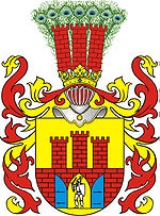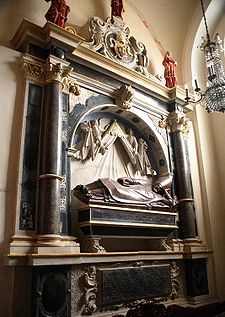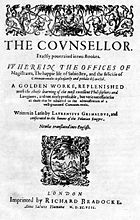
Wawrzyniec Grzymala Goslicki
Encyclopedia
Wawrzyniec Grzymała Goślicki was a Polish
nobleman, Bishop of Poznań (1601–1607), political thinker and philosopher best known for his book De optimo senatore
(1568; English translation: The Counsellor, 1598).

's Jagiellonian University
and at Padua
and Bologna
, he entered the Roman Catholic Church
. In 1569 he also joined the Polish royal chancery
and as a secretary served two kings, Zygmunt August
and Stefan Batory
, and was successively appointed bishop of Kamieniec Podolski (1586), Chełm (1590), Przemyśl
(1591), and Poznań
(1601). Goślicki was a man of affairs, highly esteemed by contemporaries, and frequently engaged in active politics. He was also a staunch advocate of religious tolerance in Poland. It was due to his influence and to a letter that he wrote to the Pope
against the Jesuits that they were prevented from establishing schools at Kraków
during his reign. He was the only prelate
who, in 1587, acceded to the Warsaw Confederation
.
Goślicki's Latin book De optimo senatore
(published during his stay in Italy in Venice, 1568) and dedicated to King Zygmunt August, subsequently appeared in two English translations, as A commonwealth of good counsaile (1607) and as The Accomplished Senator... Done into English... By Mr. Oldisworth (1733). In this book Goślicki shows the ideal statesman who is well versed in the humanities as well as in economy, politics, and law. He argued that law is above the ruler, who must respect it, and that it is illegitimate to rule over a people against its will. He equated godliness with reason, and reason with law. Many of the book's ideas comprised the foundations of Polish Nobles' Democracy
(1505–1795) and were based on 14th-century writings by Stanisław of Skarbimierz. The book was not translated into Polish for 400 years.
 The book was influential abroad, exporting the ideas of Poland's Golden Freedom and democratic system. It was a political and social classic, widely read and long popular in England after its 1598 translation; read by Elizabeth I of England
The book was influential abroad, exporting the ideas of Poland's Golden Freedom and democratic system. It was a political and social classic, widely read and long popular in England after its 1598 translation; read by Elizabeth I of England
, it was also known by Shakespeare, who used his depiction of an incompetent senator as a model for Polonius
in Hamlet
. Its ideas might be seen in the turmoil that gripped England around the times of Glorious Revolution
. Goślicki's ideas were perhaps suggestive for future national constitutions. Goślicki never wrote that "all men are created equal," but did say, "Sometimes a people, justly provoked and irritated, by the Tyranny and Usurpations of their Kings, take upon themselves the undoubted Right of vindicating their own liberties." The book was allegedly read by Robert Bellarmine
, Algernon Sydney
and Thomas Jefferson
(who had it in his library), but there is no evidence of a direct link with Jefferson's Declaration of Independence
.
Goślicki argued that distinguished senators were more useful to a state than the king or the common people:
He was an influence in the framing the Polish Constitution of 3 May 1791, which historian Norman Davies
calls "the first constitution of its kind in Europe".

Poland
Poland , officially the Republic of Poland , is a country in Central Europe bordered by Germany to the west; the Czech Republic and Slovakia to the south; Ukraine, Belarus and Lithuania to the east; and the Baltic Sea and Kaliningrad Oblast, a Russian exclave, to the north...
nobleman, Bishop of Poznań (1601–1607), political thinker and philosopher best known for his book De optimo senatore
De optimo senatore
De optimo senatore was a book by Wawrzyniec Grzymała Goślicki published in Venice in 1568, republished in Basel , and then translated into English and published in 1598 and in 1607....
(1568; English translation: The Counsellor, 1598).

Biography
Born near Płock, after studying at KrakówKraków
Kraków also Krakow, or Cracow , is the second largest and one of the oldest cities in Poland. Situated on the Vistula River in the Lesser Poland region, the city dates back to the 7th century. Kraków has traditionally been one of the leading centres of Polish academic, cultural, and artistic life...
's Jagiellonian University
Jagiellonian University
The Jagiellonian University was established in 1364 by Casimir III the Great in Kazimierz . It is the oldest university in Poland, the second oldest university in Central Europe and one of the oldest universities in the world....
and at Padua
Padua
Padua is a city and comune in the Veneto, northern Italy. It is the capital of the province of Padua and the economic and communications hub of the area. Padua's population is 212,500 . The city is sometimes included, with Venice and Treviso, in the Padua-Treviso-Venice Metropolitan Area, having...
and Bologna
Bologna
Bologna is the capital city of Emilia-Romagna, in the Po Valley of Northern Italy. The city lies between the Po River and the Apennine Mountains, more specifically, between the Reno River and the Savena River. Bologna is a lively and cosmopolitan Italian college city, with spectacular history,...
, he entered the Roman Catholic Church
Roman Catholic Church
The Catholic Church, also known as the Roman Catholic Church, is the world's largest Christian church, with over a billion members. Led by the Pope, it defines its mission as spreading the gospel of Jesus Christ, administering the sacraments and exercising charity...
. In 1569 he also joined the Polish royal chancery
Kanclerz
Kanclerz was one of the highest officials in the historic Poland. This office functioned from the early Polish kingdom of the 12th century until the end of the Polish-Lithuanian Commonwealth in 1795. A respective office also existed in the Grand Duchy of Lithuania since the 16th...
and as a secretary served two kings, Zygmunt August
Sigismund II Augustus
Sigismund II Augustus I was King of Poland and Grand Duke of Lithuania, the only son of Sigismund I the Old, whom Sigismund II succeeded in 1548...
and Stefan Batory
Stephen Báthory
Stephen Báthory may refer to several noblemen of Hungarian descent:* Stephen III Báthory , Palatine of Hungary* Stephen V Báthory , judge of the Royal Court and Prince of Transylvania...
, and was successively appointed bishop of Kamieniec Podolski (1586), Chełm (1590), Przemyśl
Przemysl
Przemyśl is a city in south-eastern Poland with 66,756 inhabitants, as of June 2009. In 1999, it became part of the Podkarpackie Voivodeship; it was previously the capital of Przemyśl Voivodeship....
(1591), and Poznań
Poznan
Poznań is a city on the Warta river in west-central Poland, with a population of 556,022 in June 2009. It is among the oldest cities in Poland, and was one of the most important centres in the early Polish state, whose first rulers were buried at Poznań's cathedral. It is sometimes claimed to be...
(1601). Goślicki was a man of affairs, highly esteemed by contemporaries, and frequently engaged in active politics. He was also a staunch advocate of religious tolerance in Poland. It was due to his influence and to a letter that he wrote to the Pope
Pope
The Pope is the Bishop of Rome, a position that makes him the leader of the worldwide Catholic Church . In the Catholic Church, the Pope is regarded as the successor of Saint Peter, the Apostle...
against the Jesuits that they were prevented from establishing schools at Kraków
Kraków
Kraków also Krakow, or Cracow , is the second largest and one of the oldest cities in Poland. Situated on the Vistula River in the Lesser Poland region, the city dates back to the 7th century. Kraków has traditionally been one of the leading centres of Polish academic, cultural, and artistic life...
during his reign. He was the only prelate
Prelate
A prelate is a high-ranking member of the clergy who is an ordinary or who ranks in precedence with ordinaries. The word derives from the Latin prælatus, the past participle of præferre, which means "carry before", "be set above or over" or "prefer"; hence, a prelate is one set over others.-Related...
who, in 1587, acceded to the Warsaw Confederation
Warsaw Confederation
The Warsaw Confederation , an important development in the history of Poland and Lithuania that extended religious tolerance to nobility and free persons within the Polish-Lithuanian Commonwealth. , is considered the formal beginning of religious freedom in the Polish-Lithuanian Commonwealth, and...
.
Goślicki's Latin book De optimo senatore
De optimo senatore
De optimo senatore was a book by Wawrzyniec Grzymała Goślicki published in Venice in 1568, republished in Basel , and then translated into English and published in 1598 and in 1607....
(published during his stay in Italy in Venice, 1568) and dedicated to King Zygmunt August, subsequently appeared in two English translations, as A commonwealth of good counsaile (1607) and as The Accomplished Senator... Done into English... By Mr. Oldisworth (1733). In this book Goślicki shows the ideal statesman who is well versed in the humanities as well as in economy, politics, and law. He argued that law is above the ruler, who must respect it, and that it is illegitimate to rule over a people against its will. He equated godliness with reason, and reason with law. Many of the book's ideas comprised the foundations of Polish Nobles' Democracy
Nobles' Democracy
Nobles' Democracy may refer to* History of Poland * Golden Liberty, the political system of that time in the Polish-Lithuanian Commonwealth...
(1505–1795) and were based on 14th-century writings by Stanisław of Skarbimierz. The book was not translated into Polish for 400 years.

Elizabeth I of England
Elizabeth I was queen regnant of England and Ireland from 17 November 1558 until her death. Sometimes called The Virgin Queen, Gloriana, or Good Queen Bess, Elizabeth was the fifth and last monarch of the Tudor dynasty...
, it was also known by Shakespeare, who used his depiction of an incompetent senator as a model for Polonius
Polonius
Polonius is a character in William Shakespeare's Hamlet. He is King Claudius's chief counsellor, and the father of Ophelia and Laertes. Polonius connives with Claudius to spy on Hamlet...
in Hamlet
Hamlet
The Tragical History of Hamlet, Prince of Denmark, or more simply Hamlet, is a tragedy by William Shakespeare, believed to have been written between 1599 and 1601...
. Its ideas might be seen in the turmoil that gripped England around the times of Glorious Revolution
Glorious Revolution
The Glorious Revolution, also called the Revolution of 1688, is the overthrow of King James II of England by a union of English Parliamentarians with the Dutch stadtholder William III of Orange-Nassau...
. Goślicki's ideas were perhaps suggestive for future national constitutions. Goślicki never wrote that "all men are created equal," but did say, "Sometimes a people, justly provoked and irritated, by the Tyranny and Usurpations of their Kings, take upon themselves the undoubted Right of vindicating their own liberties." The book was allegedly read by Robert Bellarmine
Robert Bellarmine
Robert Bellarmine was an Italian Jesuit and a Cardinal of the Catholic Church. He was one of the most important figures in the Counter-Reformation...
, Algernon Sydney
Algernon Sydney
Algernon Sidney or Sydney was an English politician, republican political theorist, colonel, and opponent of King Charles II of England, who became involved in a plot against the King and was executed for treason.-Early life:Sidney's father was Robert Sidney, 2nd Earl of Leicester, a direct...
and Thomas Jefferson
Thomas Jefferson
Thomas Jefferson was the principal author of the United States Declaration of Independence and the Statute of Virginia for Religious Freedom , the third President of the United States and founder of the University of Virginia...
(who had it in his library), but there is no evidence of a direct link with Jefferson's Declaration of Independence
Declaration of independence
A declaration of independence is an assertion of the independence of an aspiring state or states. Such places are usually declared from part or all of the territory of another nation or failed nation, or are breakaway territories from within the larger state...
.
Goślicki argued that distinguished senators were more useful to a state than the king or the common people:
- For the king, being alone, cannot see everything and it often happens that either he yields to desires or his emotions disturb his ability of discretion. Also an ignorant crowd without a thought and head (as a proverb says) cannot by any means possess such prudence, while the senate, composed of men distinguished by virtue, prudence, and glory of accomplished deeds is capable from its middle position, as if from an observation point, of caring for the common weal of the state, perceiving those matters which are beneficial, and freeing it from disturbances, rebellions, and dangers.
He was an influence in the framing the Polish Constitution of 3 May 1791, which historian Norman Davies
Norman Davies
Professor Ivor Norman Richard Davies FBA, FRHistS is a leading English historian of Welsh descent, noted for his publications on the history of Europe, Poland, and the United Kingdom.- Academic career :...
calls "the first constitution of its kind in Europe".
See also

- Polish-Lithuanian CommonwealthPolish-Lithuanian CommonwealthThe Polish–Lithuanian Commonwealth was a dualistic state of Poland and Lithuania ruled by a common monarch. It was the largest and one of the most populous countries of 16th- and 17th‑century Europe with some and a multi-ethnic population of 11 million at its peak in the early 17th century...
- szlachtaSzlachtaThe szlachta was a legally privileged noble class with origins in the Kingdom of Poland. It gained considerable institutional privileges during the 1333-1370 reign of Casimir the Great. In 1413, following a series of tentative personal unions between the Grand Duchy of Lithuania and the Kingdom of...
- sarmatismSarmatism"Sarmatism" is a term designating the dominant lifestyle, culture and ideology of the szlachta of the Polish-Lithuanian Commonwealth from the 16th to the 19th centuries. Together with "Golden Liberty," it formed a central aspect of the Commonwealth's culture...
- Andrzej Frycz ModrzewskiAndrzej Frycz ModrzewskiAndrzej Frycz Modrzewski was a Polish Renaissance scholar, humanist and theologian, called "the father of Polish democracy." His book De Republica emendanda was widely read and praised across most of Renaissance Europe.-Life:Modrzewski was born in Wolbórz Andrzej Frycz Modrzewski (ca....
- Andrzej Maksymilian FredroAndrzej Maksymilian FredroAndrzej Maksymilian Fredro was a Polish szlachcic, writer.He was castellan of Lwów beginning 1654 and voivode of Podole Voivodship beginning 1676....
Further reading
- Wenceslas J. Wagner et al., Laurentius Grimaldius Gosliscius at His Age - Modern Constitutional Law Ideas in the Sixteenth Century, in 'Polish Law Throughout the Ages'
- W. J. Stankiewicz, The accomplished senator of Laurentius Gosliscius
- Teresa Bałuk-Ulewiczowa, The Senator of Laurentius Goslicius and the Elizabethan Counsellor, in 'The Polish Renaissance'
- Teresa Bałuk-Ulewiczowa, Goslicius' Ideal Senator and His Cultural Impact over the Centuries: Shakespearean Reflections. Kraków: Polish Academy of Arts and Sciences and Jagiellonian University, 2009.
- Aleksander Stępkowski (ed.), O senatorze doskonałym studia. Warszawa: Kancelaria Senatu, 2009 http://books.google.com/books?id=kbs9nI9Z-ZIC&dq=%22o+senatorze+doskona%C5%82ym+studia%22&printsec=frontcover&source=bl&ots=JEE4Fd4CkR&sig=zw1PhwAGJZ7StZAI0PRNlRx5wbY&hl=pl&ei=PQamSrHmAsOg_Abxhcm-CQ&sa=X&oi=book_result&ct=result&resnum=1(collective volume in Polish with essays by A. Stępkowski, J. Mańkowski, M.A. Janicki, R. Lollo, and T. Bałuk-Ulewiczowa). Szczucki, Lech (ed.). Filozofia i myśl społeczna XVI wieku. Warszawa: PWN, 1978, 314–315.

